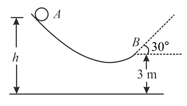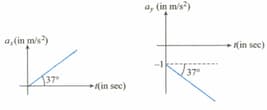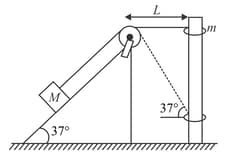B M Sharma Solutions for Chapter: Work, Energy and Power, Exercise 70: Exercises
B M Sharma Physics Solutions for Exercise - B M Sharma Solutions for Chapter: Work, Energy and Power, Exercise 70: Exercises
Attempt the practice questions on Chapter 8: Work, Energy and Power, Exercise 70: Exercises with hints and solutions to strengthen your understanding. PHYSICS For Joint Entrance Examination JEE (Advanced) Mechanics I solutions are prepared by Experienced Embibe Experts.
Questions from B M Sharma Solutions for Chapter: Work, Energy and Power, Exercise 70: Exercises with Hints & Solutions
Two springs and , having stiffness constants and respectively. If equal forces are applied on two springs, then,
A ball released at leaves the frictionless track at , which is at a height of from the ground. The ball further rises maximum up to above the ground before falling down. Find if the track at makes an angle of with the horizontal.

Two objects are connected by a light string passing over a light, frictionless pulley as shown in the figure. The object of mass is released from rest at a height above the table. Find the maximum height above the table to which the object rises (in ).

In the figure, the variation of components of acceleration of a particle of mass is shown w.r.t. time. The initial velocity of the particle is . Find the total work done by the resultant force on the particle in the time interval from to seconds in .

As shown in the figure, there is no friction between the horizontal surface and the lower block but the friction coefficient between both the blocks is . Both the blocks move together with initial speed towards the spring, compresses it and due to the force exerted by the spring, moves in the reverse direction of the initial motion. Find the maximum value of so that during the motion, there is no slipping between the blocks. .

The potential energy (in SI units) of a particle of mass in a conservative field is, . If the initial velocity of the particle is, , then find the total distance () travelled by the particle in first two seconds.
Two blocks having masses and are connected to the two ends of a light spring. The system is placed on a smooth horizontal floor. An inextensible string also connects with ceiling as shown in the figure at the initial moment. Initially, the spring has its natural length. A constant horizontal force is applied to the heavier block as shown. What is the maximum possible value of so the lighter block does not lose contact with ground.

A ring of mass can slide over a smooth vertical rod. A light string attached to the ring passing over a smooth fixed pulley at a distance of from the rod is shown in the figure. At the other end of the string, mass is attached, lying over a smooth fixed inclined plane of inclination angle . The ring is held in level with the pulley and released. Determine the velocity of ring when the string makes an angle with the horizontal,

